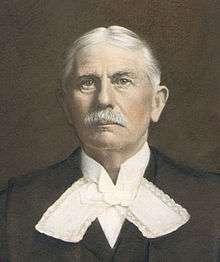Charles John Johnston
| The Honourable Sir Charles John Johnston | |
|---|---|
 In Speaker's robes | |
| 14th Speaker of the Legislative Council | |
|
In office 1915–1918 | |
| Preceded by | Charles Bowen |
| Succeeded by | Walter Carncross |
| Personal details | |
| Born |
11 October 1845 Wellington, New Zealand |
| Died |
13 June 1918 (aged 72) Wellington, New Zealand |
| Political party | Independent |
Charles John Johnston (11 October 1845 – 13 June 1918) was the Mayor of Wellington, New Zealand in 1890, the Jubilee year. He was Speaker of the Legislative Council for the last three years of his life.
Biography
He was born 11 October 1845 in Wellington, the son of merchant John Johnston. He was educated at Wellington Commercial and Grammar School, and was later educated in England at the Catholic College of St. Mary in Derbyshire, and at Kensington Grammar School in London. He returned to NZ in 1864 and entered Johnston & Co who were ship owners and merchants. His family was descended from the Johnstons of Annandale, through the Ayrshire Branch of the family.[1]
He joined the volunteers and when the Wellington Brigade was formed was appointed to the rank of Captain. When he moved to the active-reserve he was appointed Captain-Commandant. Two of his eight sons were killed in action in World War I, Brigadier-General Francis Earl Johnston and Captain Octavius Featherston Johnston. Another four of his sons also served in World War I - Guy, Charles, Harold and Ian Johnston. Johnston also had three daughters - Zoë, Alice and Doris. Zoë was also widowed on the death of her husband William Fitzgerald Levin from injuries suffered at Gallipoli.
| Parliament of New Zealand | ||||
| Years | Term | Electorate | Party | |
| 1881–1884 | 8th | Te Aro | Independent | |
| 1884–1887 | 9th | Te Aro | Independent | |
He represented the Te Aro electorate from 1881 to 1887, when he resigned.[2] He was a member of the Legislative Council from 1891 until his death in 1918,[3] and the Speaker from 1915 to 1918.[4] He was appointed from 22 January 1891 as one of seven new members (including Harry Atkinson himself) appointed to the Council by the outgoing fourth Atkinson Ministry; a move regarded by Liberals as a stacking of the upper house against the new government.
He married Alice Margaret Featherston, daughter of Isaac Featherston, at Wellington on 12 Jan 1871. He died in Wellington on 13 June 1918 after a prolonged illness.
Posthumously knighted.
A brother Walter Woods Johnston was also an MP.[5]
His fourth son, Harold Featherston Johnston (1875–1959), became a judge of the Supreme Court and was appointed King's Counsel in 1930.[6] Upon the death of Charles Skerrett in 1929, the position of Chief Justice was offered to Harold Johnston, who declined the offer, and Michael Myers became the next Chief Justice instead.[7] Harold Johnston unsuccessfully stood for the Reform Party in the 1929 by-election in the Hutt electorate.[8]
Notes
- ↑ "Death of Sir Charles Johnston". The Evening Post. XCV (140). 13 June 1918. p. 8.
- ↑ Wilson 1985, p. 208.
- ↑ Wilson 1985, p. 156.
- ↑ Wilson 1985, p. 201681.
- ↑ Ralston, Bruce. "Johnston, Walter Woods". Dictionary of New Zealand Biography. Ministry for Culture and Heritage. Retrieved 13 January 2012.
- ↑ "Queen's Counsel appointments since 1907 as at July 2013" (PDF). Crown Law Office. Retrieved 4 September 2013.
- ↑ Spiller, Peter. "Myers, Michael". Dictionary of New Zealand Biography. Ministry for Culture and Heritage. Retrieved 27 March 2014.
- ↑ "The Hutt Seat". The Evening Post. CXII (108). 3 November 1931. p. 8. Retrieved 18 November 2014.
References
- Wilson, James Oakley (1985) [First published in 1913]. New Zealand Parliamentary Record, 1840–1984 (4th ed.). Wellington: V.R. Ward, Govt. Printer. OCLC 154283103.
- No Mean City by Stuart Perry (1969, Wellington City Council) includes a paragraph and a portrait or photo for each mayor.
| Political offices | ||
|---|---|---|
| Preceded by Charles Bowen |
Speaker of the New Zealand Legislative Council 1915–1918 |
Succeeded by Walter Carncross |
| Preceded by John Duthie |
Mayor of Wellington 1890 |
Succeeded by Arthur Winton Brown |